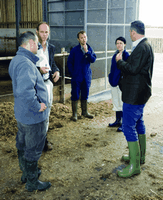Dairy Farmer of the Year Finalists – Paul Colwill

Paul Colwill – Welsford Farm, near Hartland, Devon
Dairy farming is in Paul Colwill’s blood. He is the fifth generation of the family to live at Welsford Farm and he’s hoping he won’t be the last.
But that doesn’t mean he expects his young son or daughter to take over the farm come what may. He wants to be able to hand over a profitable business with a decent work/life balance as part of the package.
Paul, who left school at 16, is well on the way to doing just that, but the farm’s location meant this hasn’t always been easy and
| Farm Facts |
|---|
| Farm size: 530 acres (100 acres rented) No Cows: 450 Holstein Fresians Dairy System: Flying grazed herd Milk Buyer: Parkham Farms |
When Paul came home after gaining a National Diploma with distinction at Bicton College and relief milking in New Zealand for six months, there were only 160 cows on the farm, now there is almost three times that number with further growth in the pipeline.
Boosting numbers to 250 was relatively simple using existing buildings and family labour, but it was the next step that really highlighted Paul’s determination and willingness to invest to make the business financially viable and easily managed.
While many dairy farmers still work themselves into the ground for little reward, Paul says this is not sustainable if the industry is to prosper and be attractive for the next generation.
However, 250 cows could not justify taking on extra labour so the tough decision to spend hundreds of thousands of pounds on a new cubicle shed and increasing capacity to 500 cows was taken.
But Paul doesn’t just rely on his own judgement, he likes to co-operate with other committed producers and benchmark himself against them. Support from other members of the invitation-only 10-0-1 discussion group, which is run by respected consultant
John Allen, gave him the confidence to take on the daunting challenge.
The decision was taken when milk prices were only 18p/litre, but even then the numbers still stacked up and allowed the farm to employ two more people, a husband-and-wife team from Poland. This has added over £30,000 to the bottom line each year and radically improved the quality of life for him and his family.
Despite the increase in size, running the farm has never been easier, says Paul.
Most of the farm’s grassland, which climbs up to moor level, is cut off from the milking parlour and buildings by a road.
This meant bringing in the cows early every morning and sending them back each night was an unenviable task, especially when some of them decided to go walk about down the road.
The new cubicle building means there is room to house the herd at night, resulting in better working conditions and higher milk yields.
Keeping things simple is part of his philosophy. The farm has a flying herd, which allows Paul to concentrate on what he is loves doing, getting milk from his cows. These are crossed with Limousin genetics and the calves are sold at eight weeks.
Bulls make £185 and heifers go for £135.
None of the top-paying retailer milk contracts are available in the area so Paul is careful to maximise the returns from his contract with nearby cheesemaker Parkham Farms. Optimising the protein and fat content of his milk has increased his price by 1p/litre.
The farm is in an Area of Outstanding Natural Beauty and Paul is committed to wildlife conservation. He has applied to enter the Entry Level environmental scheme and FWAG is also coming to look at the farm.
 Just a few hours with Paul is enough to convince you that there is a bright future for the dairy industry and he is one of the young people to drive the sector forward. But he remains frustrated that the dairy supply chain seems unprepared to invest in this future and many farmers appear unwilling to make the necessary changes and still rely on support payments that alienate the public from farmers.
Just a few hours with Paul is enough to convince you that there is a bright future for the dairy industry and he is one of the young people to drive the sector forward. But he remains frustrated that the dairy supply chain seems unprepared to invest in this future and many farmers appear unwilling to make the necessary changes and still rely on support payments that alienate the public from farmers.
Talking to the motorists waiting for his cows to cross the road, Paul says he has been able to convince many that, contrary to public opinion, milk production is not about factory farming and destroying the environment.
At the age of just 34 Paul has already achieved much and it is young, progressive, driven farmers like him, who are not locked in the past and can communicate to the public, that will ensure that there is an industry worth joining for the next generation of milk producers.
| What the judges liked |
|---|
|
